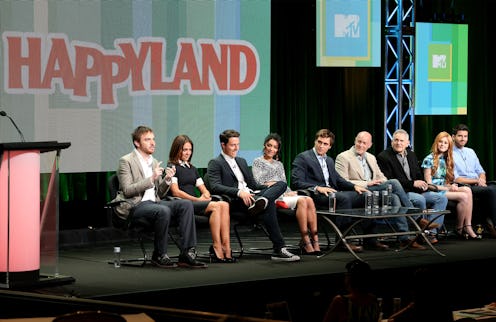Entertainment
Meet the writing duo behind MTV's 'Happyland'
With shows like Sleepy Hollow, How to Get Away With Murder, and Black-ish, we're finally seeing realistic diversity on our television screens, and MTV's new scripted dramedy Happyland is a reflection of that, both in front of and behind the scenes. In front of the camera, Happyland boasts two Latina actresses as their leads, Camille Guaty and Bianco Santos. Their characters, Elena and Lucy respectively, are not burdened by the usual hyper-sexualized Latina tropes: Lucy is an ambitious and witty teenager counting the days until college and her mom, Elena, is a hopeless romantic that would rather live in the fantasy world of Happyland than the harsh reality of living paycheck to paycheck.
Behind the scenes, the show has a female show-runner and three Latina writers. “What intrigued me about the show is that our lead, Lucy Velez, is hispanic, and so is her mom... I thought it was really cool and very relatable. I’m half Cuban, as well, so we tried to bring into our episodes some of that authenticity,” says Erica Harrell, staff writer for Happyland.
While MTV’s new teen dramedy has received mixed reviews and modest ratings compared to its predecessors Awkward and Faking It, the show holds its own with an accurate and diverse portrayal of life at a major amusement park. That’s probably why MTV hired Hollywood’s up-and-coming writing duo Desirée Proctor and Harrell, the show’s “park experts,” to give the show its amusement park authenticity.
“When I worked at Disney, the whole social hierarchy really existed, even within the character department, the face characters, the prince, the princesses getting paid more than the fur characters, like the Mickey Mouses, the Ricky Raccoons, and then on top of that the executives making hundreds of thousands of dollars versus the hourlies.”
(Left to Right, Erica and Desirée at their MTV Office)
Both Proctor and Harrell grew up and attended college near Disney World and consider themselves avid Disney-philes. Twentysomething Proctor also worked at Disney as a "fur" for two years while attending University of Central Florida. While the show's writers room is collaborative, a lot of their park experience influences the storytelling.
“Because Desirée has first hand experience and I am from Florida, we were kind of like the park experts. They would go and ask Desirée specifics about the room for character training and try to ground it and bring a bit of realism,” recalls Harrell.
In fact, one of the recent plot points, Elena’s reassignment from playing teenage princess Adriana after 20 years to the elderly witch character Hagula, is directly based on Proctor’s experience working at the park. “When I worked at Disney World there was a character who had started as Snow White when Disney World first opened in the 1970s and was still working there as a fairy god mother because she got too old to be a princess,” recounts Proctor.
According to the latest Women’s Media Center report, the percentages of women and men writers for broadcast, cable, and Netflix programs are 30 percent and 70 percent respectively, making the writing staff for Happyland a television unicorn. The staff consists of three female writers, three male writers, a female showrunner and male creator. That’s 50/50 all the way. And if that doesn't blow your mind, all three of the female writers with Latina backgrounds were not staffed based on diversity quotas. It just happened.
“It’s definitely one of the most diverse writing staffs. I noticed that on day one. Just having a female showrunner is so rare,” explains Proctor.
Despite the network’s progressiveness in their hiring practices, it doesn’t change the landscape of TV in Hollywood. During the 2012-13 TV season, women creators, writers, producers, executive producers, photography directors and editors only made up 28 percent of the workforce.
However, the ambitious duo aspiring to be showrunners one day, are staying optimistic despite the odds.
“I think things are getting better, that’s the good news,” says Harrell. “But it’s hard. Desirée and I as a team, we are two-for-one essentially. You get two people for the price of one because we split the salary. And sometimes it’s like ‘Oh why did you pass over two-for-one for a white guy?’”
Even with such dismal statistics and networks choosing white guys over two brilliant ladies, Proctor and Harrell won't be giving up anytime soon. “This industry is more of a marathon than a sprint and it’s all about how much time you are willing to put in," Proctor adds. "And for us, it’s more of a calling and I just can't imagine doing anything else.”
Hopefully, other major networks will start following Happyland's footsteps and begin normalizing diversity in front of and behind the screen. But for networks to do this, as media consumers, it's on us to support the shows pioneering the future of television.
Images: Erica Harrell
